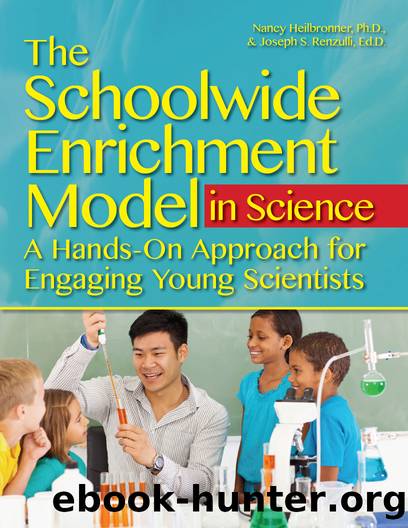The Schoolwide Enrichment Model in Science by Nancy L. Heilbronner & Joseph S. Renzulli

Author:Nancy L. Heilbronner & Joseph S. Renzulli
Language: eng
Format: epub
Publisher: Taylor and Francis
Developing Type II Skills in Students
Teachers of enrichment programs, as well as teachers of regular classrooms, will want to develop these skills throughout the academic year. To do so, careful planning is necessary, and so a Materials and Activities Selection Worksheet for Planning Type II Enrichment in Science is provided in Handout 14. The sheet is versatile, and so the SEM-Science committee might use it to plan curricular activities and resources for the school or grade for an entire academic year, or a single teacher might use it to plan for his or her own class of students.
Teachers will want to develop Type II skills in each of these areas as they progress through the curriculum in science, but the learning should be targeted toward the eventual implementation of an authentic learning project, a Type III activity. That is, the ultimate goal of teaching students how to use a secchi disk might be so that they can measure the turbidity of the local river and relate those findings in a Type III project designed to make citizens aware of local pollutants and their effects on the river. However, until students arrive at the point where they can apply these skills to an authentic learning performance, there are several levels of learning:
âºbasic knowledge,
âºâdress-rehearsal,â and
âºauthentic performance.
Basic KnowledgeâLearning the Skill
In the basic knowledge stage, the student learns about the skillâwhat it is, how it may be used, and when it is appropriate to do so. For example, a student might learn that an interview consists of seeking out someone with special knowledge or background relevant to the topic, developing questions to ask that person, meeting with him or her to ask the questions, and recording the answers. The student would also want to know the less obvious aspects of the skill, such as how to ask the questions, the ethics of revealing the purpose of the interview and gaining the participantâs permission, and more.
Dress RehearsalâPracticing the Skill
Like a dress rehearsal during a play, this stage gives students the opportunity to try out the skill before âperformingâ it, usually with other students in the classroom or with a friend or family member. Role-playing may therefore be involved. For example, if the Type II skill is interviewing, the student might interview a classmate regarding a topicâeither a topic provided by the teacher, a topic of interest to the student, or a topic that will eventually become the studentâs Type III activity. Feedback on the skill is essential at this point as the student strives to improve, and several cycles of practice may be necessary.
Authentic PerformanceâApplying the Skill
Now the student understands the skill and has had practice applying it. He or she is ready for the âauthentic performance,â which can be thought of as the opening night of a play, a time in which the skill is applied for the purpose of developing authentic work. Perhaps the student will interview experts on pollution to understand the sources of pollution in the river, or perhaps the work
Download
This site does not store any files on its server. We only index and link to content provided by other sites. Please contact the content providers to delete copyright contents if any and email us, we'll remove relevant links or contents immediately.
| Behavioral Disorders | Communicative Disorders |
| Gifted Students | Inclusive Education |
| Learning Disabled | Mentally Disabled |
| Physically Disabled |
The Art of Coaching Workbook by Elena Aguilar(51160)
Trainspotting by Irvine Welsh(21643)
Twilight of the Idols With the Antichrist and Ecce Homo by Friedrich Nietzsche(18622)
Fangirl by Rainbow Rowell(9228)
Periodization Training for Sports by Tudor Bompa(8253)
Change Your Questions, Change Your Life by Marilee Adams(7759)
This Is How You Lose Her by Junot Diaz(6877)
Asking the Right Questions: A Guide to Critical Thinking by M. Neil Browne & Stuart M. Keeley(5758)
Grit by Angela Duckworth(5604)
Red Sparrow by Jason Matthews(5467)
Paper Towns by Green John(5177)
Room 212 by Kate Stewart(5105)
Ken Follett - World without end by Ken Follett(4723)
Housekeeping by Marilynne Robinson(4436)
The Sports Rules Book by Human Kinetics(4379)
Papillon (English) by Henri Charrière(4262)
Double Down (Diary of a Wimpy Kid Book 11) by Jeff Kinney(4261)
The Motorcycle Diaries by Ernesto Che Guevara(4089)
Exercise Technique Manual for Resistance Training by National Strength & Conditioning Association(4061)
